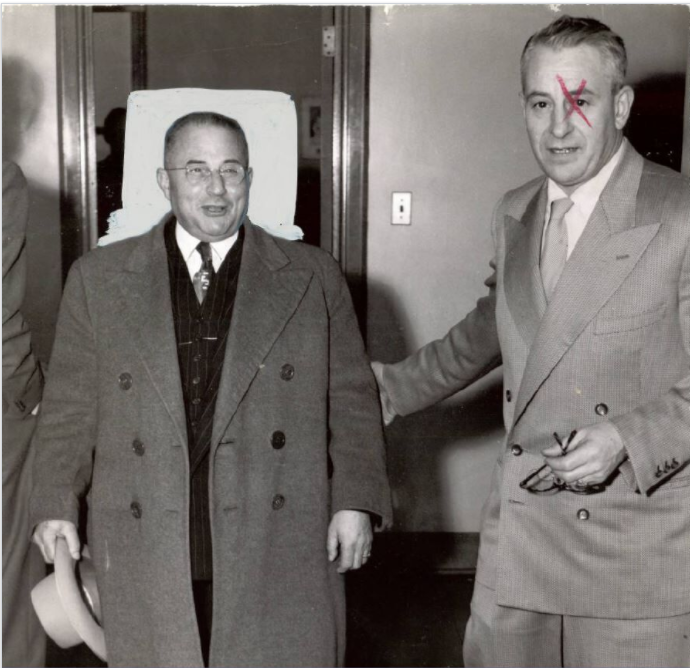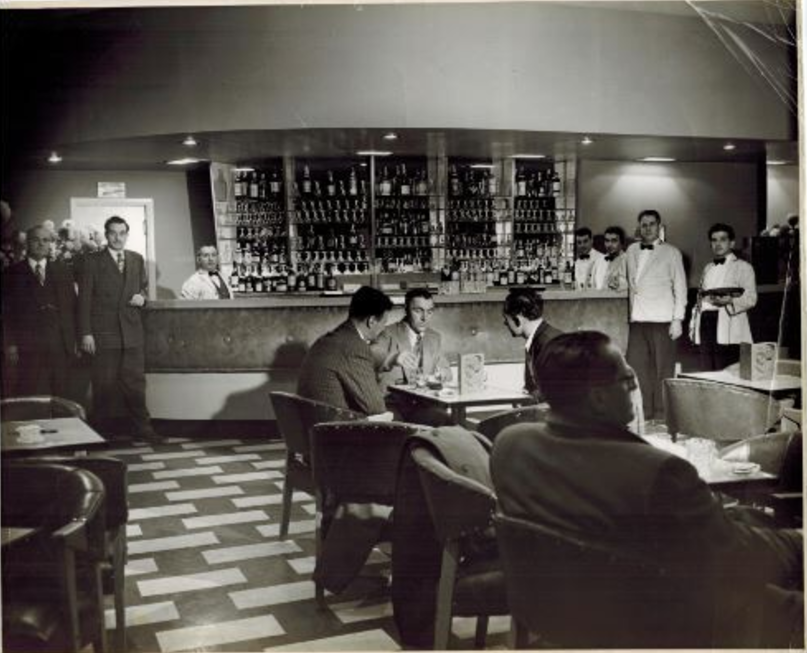One of the best parts about messing around with history, especially criminal history, is digging up connections. Angelo Branca appears as a Canadian middleweight boxing champion in the 1930s, and as the scrappy East End (Strathcona) lawyer and defender of madams and bookies in At Home with History.
In Sensational Vancouver, he is defence attorney to notorious brothel owner Joe Celona during the Tupper Royal Commission into police corruption. In another chapter, he pops up as a patron of former VPD detective Joe Ricci’s West Coast Central Club, and in another, he is boss and close friend to Tosca Trasolini a pilot and member of the Flying Seven, Canada’s first all-female aviator club.
In Blood, Sweat, and Fear, Branca swaps sides in 1935 and defends 17 VPD officers suspended for corruption. Every one of them got their job back. Ten years later he is defending a soldier accused of murdering a young woman in English Bay in 1945. It’s one of the few cases he loses in his career.
During his career, Branca defended 63 people on murder charges, and only one, Domenico Nassa, received the death penalty in 1928. Branca told his biographer that he had no quibble with that decision, but he didn’t think the soldier deserved to hang, and he fought the verdict all the way to the British Columbia Court of Appeal. He often took on pro bono cases.

Branca was born in 1903 and grew up at 343 Prior Street with parents Teresa and Filippo, two brothers John and Joseph and sister Anne. Filippo ran the grocery store on Main Street and he and Peter Tosi and Sam Minichiello were the three biggest importers of California grapes in the area.

My favourite story comes from Ray Culos whose grandfather was Sam Minichiello, and says that the joke in the neighbourhood was that wine was a family affair. Filippo would sell the grapes to the bootleggers, his son John, a detective with the dry-squad would arrest them, and his other son, Angelo, would get them off in court.
The Canadian Lawyer magazine wrote that Branca was the most famous criminal defense lawyer in Canada’s history. In 1963, he became a Supreme Court judge. Branca died in 1984.
To read more about his remarkable life, check out:
Vincent Moore’s book: Gladiator of the Courts, Douglas and McIntyre, 1981
Ray Culos’s website
© All rights reserved. Unless otherwise indicated, all blog content copyright Eve Lazarus.



9 comments on “Italian Heritage Month – meet the East End’s Angelo Branca”
[…] Eve Lazarus profiles Angelo Branca for Italian Heritage Month. Branca was a middleweight boxer who also happened to be a criminal defence attorney in Vancouver from the late 1920s to the early 1960s. But you might know him best as a former Supreme Court judge. […]
And he got Mickey Filippone off a charge of passing a counterfeit $50 bill he paid for Theatre Under the Stars tickets!
Be interesting to hear his defence on that one!
I more and more see that professionals like lawyers and scientists who work really hard on their problems are engaged powerfully in their hobbies, usually sports (like boxing here)
[…] of English Bay. A soldier was charged with her murder and defended by scrappy East End lawyer Angelo Branca. Blood, Sweat, and Fear’s Inspector Vance handled the […]
Very interesting story!
My mother and her 5 siblings were good friends with the Branca family, who also lived on Prior St. My mother told us stories about Judge Branca, she was very proud that he was a judge and Italian.
My half uncle was Angelo’s 1st son, Lloyd who was put up for adoption. My Grandfather Married Angelo’s pregnant girlfriend and wound up boxing and involved with Angelo in boxing back in the day.
I say put Angelo Branca on a postage stamp. As for the lawyers in N. B. – the IRIVINGS plantation – there is not one who can survive as a practicing barristers — nope, 99.0% of them work 1 of 3 worse judicial systems in Kanada, nothing more than a chameleon democracy. As for
“me,” I expect to have a wrongful murder conviction overturned pursuant to the heavily action of UBC Innocence Project, Peter A. Allard School of Law. Besides the one-of-a kind Branca – in my English meaning “brain” – a suggested read is Clarence Darrow’s “Attorney for the Damned.”